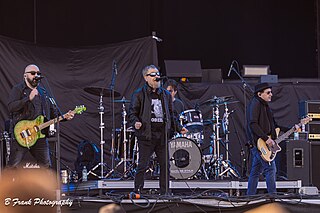
Blue Öyster Cult is an American hard rock band formed on Long Island in Stony Brook, New York, in 1967. The band has sold 25 million records worldwide, including 7 million in the United States. The band's fusion of hard rock with psychedelia, and penchant for occult, fantastical and tongue-in-cheek lyrics, had a major influence on heavy metal music. They developed a cult following and, while achieving mainstream hits like "(Don't Fear) The Reaper" (1976) and "Burnin' for You" (1981), their commercial success was limited. Both songs, and others such as "Godzilla" (1977), remain classic rock radio staples. The band were early adopters of the music video format, and their videos received heavy rotation on MTV in its early period.

Spectres is the fifth studio album by American rock band Blue Öyster Cult, released in November 1977 by Columbia Records. The album features one of the band's biggest hits, concert staple "Godzilla," and was certified gold by the RIAA on January 19, 1978.

Imaginos is the eleventh studio album by the American rock band Blue Öyster Cult. It was released in 1988, and was their last recording with their original record label, CBS/Columbia Records.

Secret Treaties is the third studio album by American rock band Blue Öyster Cult, released on April 5, 1974 by Columbia. It features the same band members and production team as their previous album.
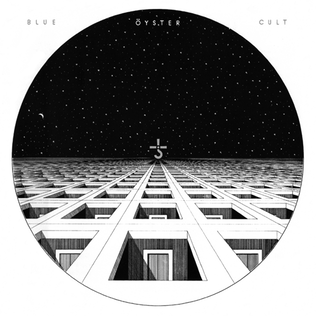
Blue Öyster Cult is the debut studio album by the American rock band Blue Öyster Cult, released in January 1972 by Columbia Records. The album featured songs such as "Cities on Flame with Rock and Roll", "Stairway to the Stars", and "Then Came the Last Days of May", all of which the band still plays regularly during its concerts. Despite positive reviews, the album failed to chart for some time before finally cracking the Billboard 200 chart on May 20, 1972, peaking at No. 172. Blue Öyster Cult toured with artists such as The Byrds, Alice Cooper and the Mahavishnu Orchestra to support the album.

Tyranny and Mutation, the second studio album by American rock band Blue Öyster Cult, was released in February 1973 by Columbia Records. It was produced by Murray Krugman and Sandy Pearlman. On May 12, 1973, the album peaked at No. 122 on the Billboard 200 chart.

On Your Feet or on Your Knees is the first live album by American rock band Blue Öyster Cult, released on February 27, 1975 by Columbia Records. The album features three songs from each of the band's first three studio albums, two covers, and one original instrumental that remains a staple of the band's live shows to this day. The 12 songs include performances at the Academy of Music in New York City, the Paramount Theatre in Portland, the Paramount Theatre in Seattle, the Show Palace in Phoenix, the Long Beach Arena, the P.N.E. Coliseum in Vancouver and the Capitol Theatre in New Jersey, although it is not clear which songs came from which venues and on what dates.

Mirrors is the sixth studio album by American rock band Blue Öyster Cult, released on June 19, 1979. It was the first BÖC album not produced by long-time producer and manager Sandy Pearlman, instead being produced by Tom Werman.

Extraterrestrial Live is the third live album by American rock band Blue Öyster Cult, released in 1982 by Columbia Records. It primarily documents the band's 1981 tour in support of Fire of Unknown Origin, but also includes two tracks recorded in 1980 during the Mirrors Tour and the North American leg of Black Sabbath's Heaven & Hell Tour. Midway through the 1981 Fire of Unknown Origin tour, the band fired drummer and founding member Albert Bouchard, replacing him with roadie Rick Downey.

The Revölution by Night is the ninth studio album by American rock band Blue Öyster Cult, released on November 8, 1983. The album was intended to capitalize on the success of Fire of Unknown Origin two years prior, hence the blend of straight-ahead rock and pop elements. This was the first BÖC album not to feature all of the band's classic members, drummer Albert Bouchard having been fired during the previous tour and replaced by roadie Rick Downey.

Club Ninja is the tenth studio album by American rock band Blue Öyster Cult, released on December 10, 1985, in the United Kingdom and on February 11, 1986, in the United States. The album was intended as a comeback for the band, whose previous album The Revölution by Night failed to attain Gold status following the success of 1981's Fire of Unknown Origin and 1982's Extraterrestrial Live. Club Ninja sold more than 175,000 copies, falling well short of gold status again, and because of its high cost, Columbia Records executives deemed it a commercial failure. The album was re-issued on compact disc on March 10, 2009, by Sony-owned reissue label American Beat Records, which had also reissued the band's 1988 album, Imaginos.
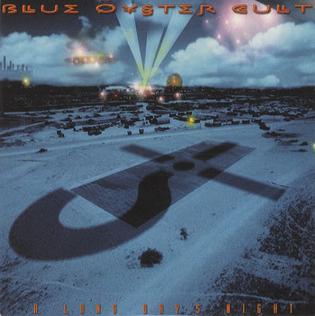
A Long Day's Night is a live album by American hard rock band Blue Öyster Cult, recorded in Chicago, Illinois, on 21 June 2002. The title is a reference to the album being recorded during the summer solstice, the longest day of the year.

Eric Jay Bloom is an American musician, singer and songwriter. He is best known as the co-lead vocalist, guitar and keyboard/synthesizer player for the long-running band Blue Öyster Cult, with work on more than 20 albums. Much of his lyrical content relates to his lifelong interest in science fiction.
"Astronomy" is a song by American rock band Blue Öyster Cult that has appeared on several of the band's albums. It was first released on their 1974 album Secret Treaties. Their second live album, Some Enchanted Evening, included a version with an extended guitar solo and a third version was included on the Imaginos album. It was also re-recorded for the band's Cult Classic collection in connection with the TV miniseries of Stephen King's The Stand. Most recently, the song was included on the A Long Day's Night album.
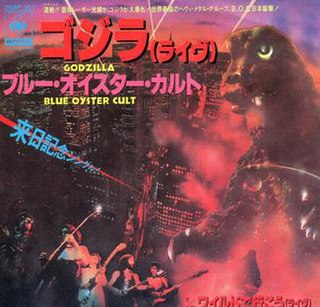
"Godzilla" is a single by U.S. hard rock band Blue Öyster Cult, the first track on the band's fifth studio album Spectres. The lyrics are a tongue-in-cheek tribute to the popular movie monster of the same name. The single release had a picture sleeve featuring a promotional still from the movie Godzilla vs. the Sea Monster. Despite failing to chart, the song received significant airplay on rock radio stations and became a sleeper hit. The song, along with "(Don't Fear) The Reaper" and "Burnin' for You," is one of the band's best-known songs and has become a staple of its live performances. It has been covered by bands such as moe., Racer X, Fu Manchu, The Smashing Pumpkins, Sebastian Bach, Double Experience and Fighting Gravity. It was the walk up song for New York Yankees slugger Hideki Matsui from 2003-2009.

St. Cecilia: The Elektra Recordings is a compilation album consisting of recordings by the American rock band the Stalk–Forrest Group, who would later be known as Blue Öyster Cult. It is a combination of two albums recorded by the group for Elektra Records – one in 1969 and the other in 1970 – as well as the promotional single "What is Quicksand?" released in 1970. Except for the single, the tracks were not officially released until 2001, although bootlegs had existed and individual tracks had been released as bonus tracks to other albums.

"Burnin' for You" is a song by American hard rock band Blue Öyster Cult. It was released as the lead single from the band's eighth studio album, Fire of Unknown Origin, released in June 1981, where it was the album's second track. The song was co-written by guitarist Donald "Buck Dharma" Roeser and rock critic songwriter Richard Meltzer, who wrote lyrics for several of the band's songs. Roeser sang lead vocals on the song in lieu of Blue Öyster Cult's usual lead vocalist Eric Bloom.
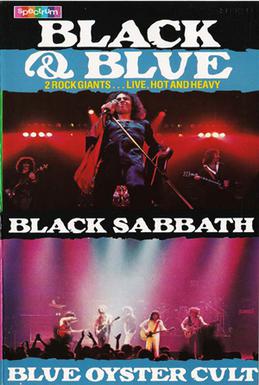
Black and Blue is a live video by hard rock bands Black Sabbath and Blue Öyster Cult filmed during their 1980 co-headlining tour of the United States, known as the "Black and Blue Tour". The film was originally released to theaters in 1981 as a concert film. It was later released on VHS, Betamax and laserdisc video format, but has not been officially released on DVD.
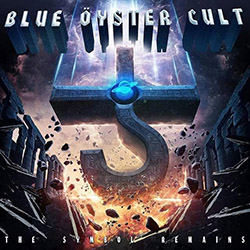
The Symbol Remains is the fourteenth studio album by American rock band Blue Öyster Cult, released on October 9, 2020.



















